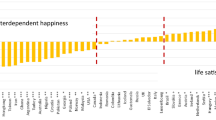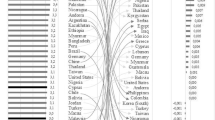Abstract
There are marked variations between nations in reported subjective well-being (SWB), but the explanations for this diversity have not been fully explored. It is possible that the differences are entirely due to true variability in SWB, but it is also reasonable that the differences may be due to factors related to self-report measurement such as variation across nations in whether it is desirable to say one is happy. At a substantive level, there might be differences in the norms governing the experience of emotion such that cultural differences in SWB are due to affective regulation. Pacific Rim countries (e.g., Japan, the People's Republic of China, and S. Korea) appear to have lower SWB than their material circumstances warrant, and the U.S.A. has higher SWB than is predicted based on its income per person. The genesis of these differences was explored by comparing students in S. Korea, Japan, and the People's Republic of China to students in the U.S.A., and it was concluded that: (1) The Pacific Rim subjects score lower on both happiness and life satisfaction in both absolute terms and when income is controlled, (2) There probably is not a general negative response set in the Pacific Rim which causes lower SWB, as evidenced by the fact that the Asians express dissatisfaction in some areas (e.g., education and self) but not in other areas (e.g., social relationships), (3) Artifacts are not causing the lower reported SWB, (4) The general suppression of mood in the Pacific Rim is unlikely to be the cause of SWB differences, but Chinese students do appear to avoid negative affect, (5) SWB is no less important and salient in Japan and S. Korea, but does appear to be a less central concern in China, and (6) There are different patterns of well-being depending on whether life satisfaction or hedonic balance are considered.
Similar content being viewed by others
References
Andrews, F. M. and S. B. Withey: 1976, Social Indicators of Well-being: America's Perception of Life Quality (Plenum Press, New York).
Bradburn, N. M.: 1969, The Structure of Psychological Well-being (Aldine, Chicago).
Diener, E.: 1984, ‘Subjective well-being’, Psychological Bulletin 95, pp. 542–575.
Diener, E.: 1994, ‘Assessing subjective well-being: Progress and opportunities’, Social Indicators Research 31, pp. 103–157.
Diener, E. and C. Diener: 1993, Most people in the United States are happy and satisfied, manuscript submitted for publication.
Diener, E. and M. Diener: 1993, Relation of Self-Esteem, Financial Satisfaction, Friendship Satisfaction, and Family Satisfaction to Life Satisfaction: A Cross-Cultural Analysis across 31 Countries, manuscript submitted for publication.
Diener, E., M. Diener and C. Diener: 1993, Factors Predicting the Subjective Well-Being of Nations, manuscript submitted for publication.
Diener, E., R. A. Emmons, R. J. Larsen and S. Griffin: 1985, ‘The Satisfaction With Life Scale’, Journal of Personality Assessment 49, pp. 71–75.
Diener, E. and F. Fujita: 1994, ‘Methodological pitfalls and solutions in satisfaction research’, in A. C. Samli and M. J. Sirgy (eds.), New Dimensions in Marketing/Quality-Of Life Interface. Quorum Books.
Diener, E., R. A. Emmons, R. J. Larsen and S. Griffin: 1985, ‘The Satisfaction With Life Scale’, Journal of Personality Assessment 49, pp. 71–75.
Diener, E., E. Sandvik, L. Seidlitz and M. Diener: 1993, ‘The relationship between income and subjective well-being: Relative or absolute?’, Social Indicators Research 28, pp. 195–223.
Easterlin, R. A.: 1974, ‘Does economic growth improve the human lot: Some empirical evidence’, in P. A. David and W. R. Levin (eds.), Nation and Households in Economic Growth (Stanford University Press, Palo Alto, CA), pp. 98–125.
Lewis, M. and C. Saarni: 1985, The Socialization of Emotions (Plenum Press, New York).
Michalos, A. C.: 1991, Global Report on Student Well-being (Springer-Verlag, New York).
Ouweneel, P. and R. Veenhoven: 1991, ‘Cross-national differences in happiness: Cultural bias or societal quality?’, in N. Bleichrodt and P. J. D. Drenth (eds.), Contemporary Issues in Cross-cultural Psychology (Swets and Zeitlinger, Amsterdam), pp. 168–184.
Pavot, W. and E. Diener: 1993, ‘Review of the Satisfaction With Life Scale’, Psychological Assessment 5, pp. 164–172.
Sandvik, E., E. Diener and L. Seidlitz: 1993, ‘Subjective well-being: The convergence and stability of self-report and nonself-report measures’, Journal of Personality 61, pp. 317–342.
Seidlitz, L. and E. Diener: 1993, ‘Memory for positive versus negative life events: Theories for the differences between happy and unhappy persons’, Journal of Personality and Social Psychology 64, pp. 654–664.
Shao, L.: 1993, Multilanguage comparability of Life Satisfaction and Happiness Measures in Mainland Chinese and American Students, unpublished masters thesis, University of Illinois, Urbana-Champaign.
Veenhoven, R.: 1991, ‘Is happiness relative?’, Social Indicators research 24, pp. 1–34.
Veenhoven, R.: 1993, Happiness in Nations (Risbo, Rotterdam).
Author information
Authors and Affiliations
Additional information
Our sincere thanks are given to Alex Michalos for organizing the world student SWB project, and for providing us with the data. We also thank Professor Michael Botwin of California State University, Fresno, for his assistance in collecting the U.S. data. In Korea, we express our gratitude to Keehak Lee whose assistance in typing and arranging the Korean questionnaires was very helpful. We express our appreciation to Xiao-ming Zhu of Hangzhou University and Ling Shao of Zhejian Institute of Technology for their assistance in recruiting subjects. Finally, our thanks are given to Marissa Diener for her comments on this paper.
Rights and permissions
About this article
Cite this article
Diener, E., Suh, E.M., Smith, H. et al. National differences in reported subjective well-being: Why do they occur?. Soc Indic Res 34, 7–32 (1995). https://doi.org/10.1007/BF01078966
Issue Date:
DOI: https://doi.org/10.1007/BF01078966




